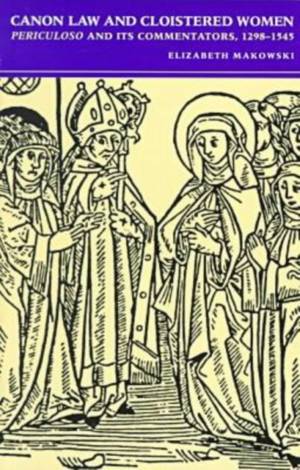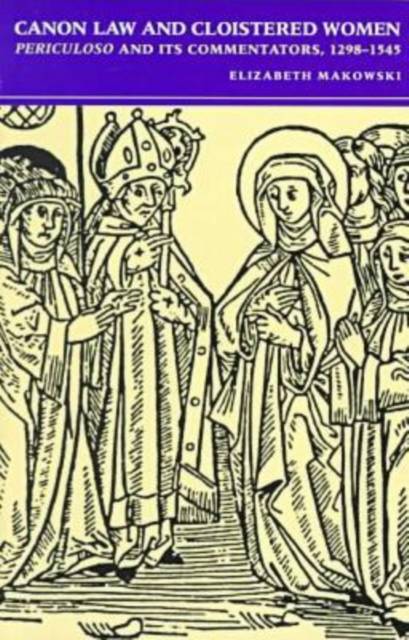
- Afhalen na 1 uur in een winkel met voorraad
- Gratis thuislevering in België vanaf € 30
- Ruim aanbod met 7 miljoen producten
- Afhalen na 1 uur in een winkel met voorraad
- Gratis thuislevering in België vanaf € 30
- Ruim aanbod met 7 miljoen producten
Omschrijving
Pope Boniface VIII (1294-1303) published a decree in 1298 that transformed long-standing attitudes toward nuns into universal Church law. Referred to as Periculoso, the first word of the Latin text, this decree announced that all nuns, no matter what rule they observed and no matter where their monasteries were located, were to be perpetually cloistered. With the exception of those who were contagiously ill, nuns were under no circumstances to break the law of enclosure, either by leaving their monasteries or by inviting unauthorized persons into them. Ultimately, the decree altered the lives of nuns, while indirectly abetting the move toward alternatives to the cloister. Although historians of women religious have frequently cited Periculoso as a milestone, the text of the law and the legal comment that its publication occasioned have never before been exhaustively studied.
Canon Law and Cloistered Women provides the most thorough examination to date of the landmark decree. Elizabeth Makowski surveys precedents for Periculoso as well as some of the problems Boniface VIII hoped to solve with his legislation. She further analyzes the commentary on Periculoso, much of it written by practicing lawyers, which unveils late medieval attitudes toward nuns and their male counterparts. Finally, she concludes with a discussion of the attempts to enforce the legislation.
Makowski's analysis illustrates not only the contribution that similar investigations of local efforts on the Continent might make to our understanding of conventual life, but also the difficulties--so often alluded to by medieval canonists--of making the "ideal" real.
ABOUT THE AUTHOR:
Elizabeth Makowski is associate professor of history at Southwest Texas State University. She is the coauthor of Wykked Wyves and the Woes of Marriage: Misogamous Literature from Juvenal to Chaucer (SUNY Press, 1989) and the author of numerous articles and book reviews.
PRAISE FOR THE BOOK:
"This is a significant contribution to the study of female monasticism. . . . Makowski's work is a welcome effort to understand the monastic discipline of enclosure and its application to convents. . . . What Makowski does in this fine study is to help scholars understand what [Periculoso] meant, both in the context in which it was fashioned and in the world of subsequent commentary. . . . An important book that should be required reading for all scholars of male and female monasticism."--Sixteenth Century Journal
"This is a clearly written survey of the decree and of medieval commentaries on it up to the Council of Trent. It will be of interest to historians both of legal and social history as well as throwing light upon the background of a much debated topic among religious orders."--English Historical Review
"[The] work is well-written, contains helpful information on the topic in context, and should be a useful resource for those interested in this historical era as well as for those intrigued by the institutional Church's less than even-handed treatment of cloistered contemplative women through the centuries."--Studia Canonica
"The clearly written survey of legal commentary on Periculoso is this book's greatest contribution. Even technical points of law are explained with sufficient clarity, so that the matters at issue can be understood even by one who is not a specialist in mediaeval canon law."--Ecclesiastical Law Journal
"This study provides insight into the way in which the leaders of the late medieval Church dealt with what they saw as the threat that women's spirituality posed to the Church and how to control it. To that extent alone, it is a valuable contribution to scholarship."--Catholic Historical Review
"Makowski has explored the comment
Specificaties
Betrokkenen
- Auteur(s):
- Uitgeverij:
Inhoud
- Aantal bladzijden:
- 149
- Taal:
- Engels
- Reeks:
Eigenschappen
- Productcode (EAN):
- 9780813209494
- Verschijningsdatum:
- 1/04/1999
- Uitvoering:
- Paperback
- Formaat:
- Trade paperback (VS)
- Afmetingen:
- 139 mm x 215 mm
- Gewicht:
- 235 g

Alleen bij Standaard Boekhandel
Beoordelingen
We publiceren alleen reviews die voldoen aan de voorwaarden voor reviews. Bekijk onze voorwaarden voor reviews.











